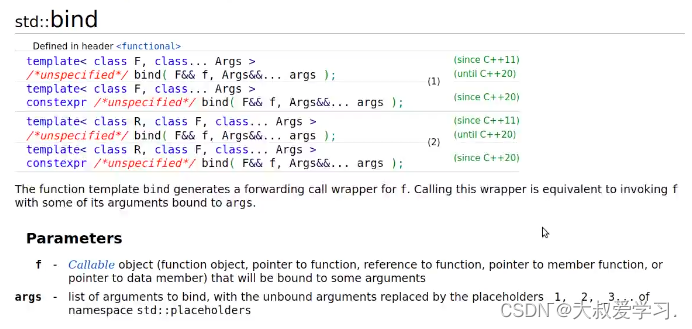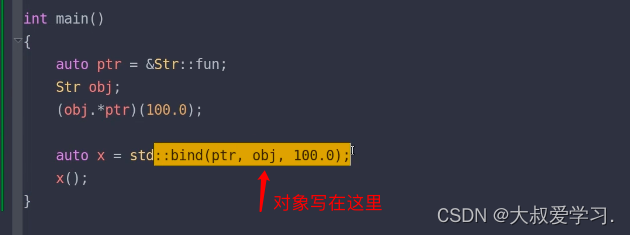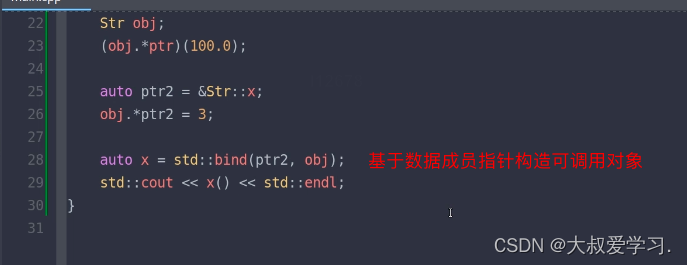析构函数

构造函数是把对象构造出来,析构函数就是把对象销毁掉。
但是注意内存的分配与释放,和构造函数与析构函数无关。
#include <iostream>
#include <string>
#include <vector>
using namespace std;
struct Str
{
Str()
{
cout << "Constructor is called" << endl;
}
// 析构函数,当对象销毁时会被调用
~Str()
{
cout << "Destructor is called" << endl;
}
int val = 3;
std::string a = "abc";
int* ptr;
};
int main()
{
Str m;
Str m2;
Str m3;
// c++构造顺序与销毁顺序是相反的,析构函数会自动调用
Str* m_ptr = new Str(); // 这个对象不会被销毁,new开辟内存,然后调用构造函数
delete m_ptr; // 释放内存,调用析构函数,销毁对象
}
除非显式声明,否则编译器自动合成。
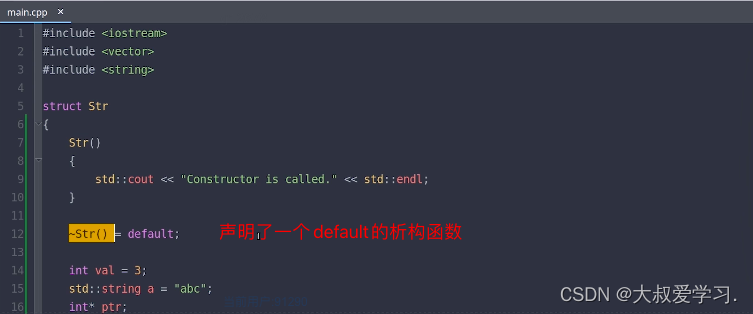
上面这句话不写,就是自动合成。
析构函数通常不能抛出异常。因为析构函数是销毁对象,一般都会被调用,如果也抛出异常,那么程序中本来有的异常就可能被隐藏。这不是我们想看到的。
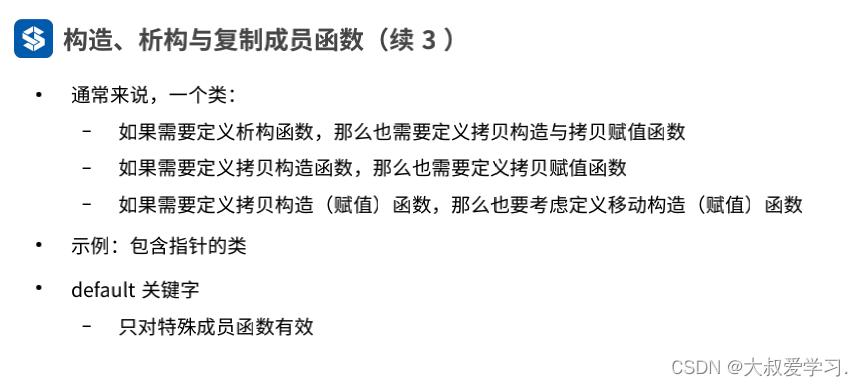
#include <iostream>
#include <string>
#include <vector>
using namespace std;
class Str
{
public:
Str() :ptr(new int()) {} // 构造函数
~Str() {delete ptr; } // 析构函数
Str(const Str& val) // 拷贝构造函数,有析构函数一般都要有拷贝构造函数
// 这样释放b之后,再释放a,就不会同一块内存释放2次了
: ptr(new int())
{
*ptr = *(val.ptr);
}
//移动构造
Str(Str&& val)
: ptr(val.ptr)
{
val.ptr = nullptr;
}
Str& operator= (const Str& val) // 赋值拷贝,把ptr指向的内容进行赋值
{
*ptr = *(val.ptr);
return *this;
}
int& Data()
{
return *ptr;
}
private:
int* ptr; // &(a.ptr) = 1234 a.ptr = 5678 5678是a.ptr存的地址;
// &(b.ptr) = 2345 b.ptr = 5678, 拷贝构造,b(a);
};
int main()
{
Str a;
a.Data() = 3;
cout << a.Data() << endl;
Str b(a); // 先销毁b,这样5678这块内存已经销毁掉了,我们在销毁a存的5678时,已经没有了,销毁了2次
b = a; // 拷贝赋值
Str c = std::move(a); // 移动构造,移动构造不开辟内存资源,是把a.ptr给了c.ptr,清空a.ptra.ptr
}
delete关键字
default 关键字 ,只对特殊成员函数有效。但是,delete对所有的函数都有效。

通常来讲,我们会给析构函数加delete。delete就是不让析构。构造函数一般可以加delete,就是不让构造。
#include <iostream>
#include <string>
#include <vector>
using namespace std;
class Str
{
public:
Str() :ptr(new int()) {} // 构造函数
// Str() = delete; // 构造函数+delete 报错 error: call to deleted constructor of 'Str'
// ~Str() {delete ptr; } // 析构函数
~Str() = delete; // 析构函数+delete 报错 attempt to use a deleted function
Str(const Str& val) // 拷贝构造函数,有析构函数一般都要有拷贝构造函数
// 这样释放b之后,再释放a,就不会同一块内存释放2次了
: ptr(new int())
{
*ptr = *(val.ptr);
}
//移动构造
Str(Str&& val)
: ptr(val.ptr)
{
val.ptr = nullptr;
}
Str& operator= (const Str& val) // 赋值拷贝,把ptr指向的内容进行赋值
{
*ptr = *(val.ptr);
return *this;
}
int& Data()
{
return *ptr;
}
private:
int* ptr; // &(a.ptr) = 1234 a.ptr = 5678 5678是a.ptr存的地址;
// &(b.ptr) = 2345 b.ptr = 5678, 拷贝构造,b(a);
};
int main()
{
Str a;
a.Data() = 3;
cout << a.Data() << endl;
Str b(a); // 先销毁b,这样5678这块内存已经销毁掉了,我们在销毁a存的5678时,已经没有了,销毁了2次
b = a; // 拷贝赋值
Str c = std::move(a); // 移动构造,移动构造不开辟内存资源,是把a.ptr给了c.ptr,清空a.ptra.ptr
}
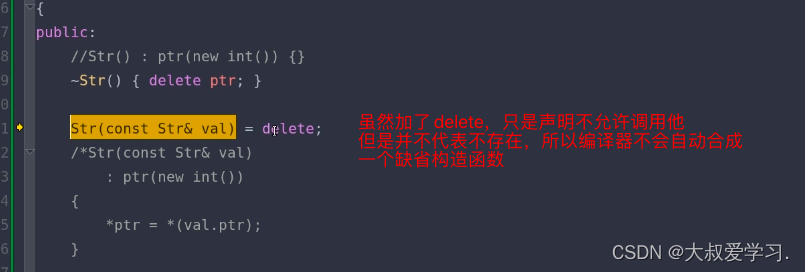
通常不要给移动构造和移动赋值引入delete限定符。
如果只需要拷贝行为,那么引入拷贝构造和拷贝赋值即可。
如果不需要拷贝行为,那么拷贝构造和拷贝赋值只需要一个声明+delete限定符即可。
不要为移动构造或者移动赋值引入delete。
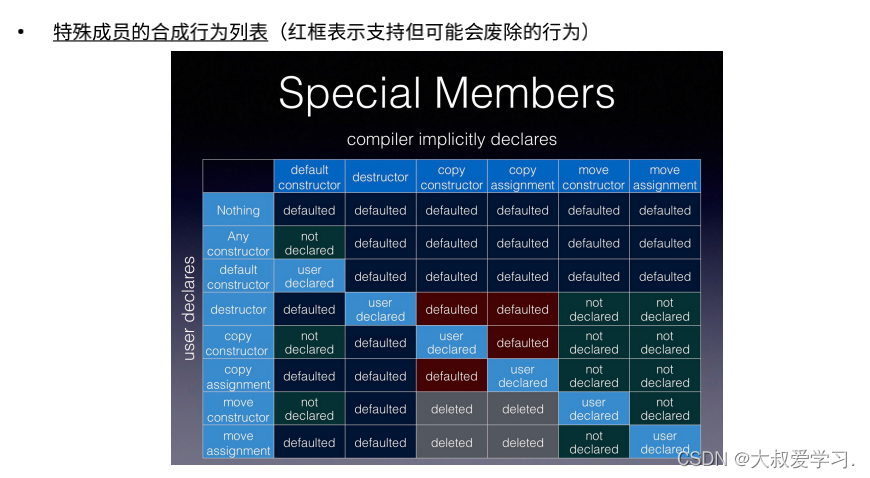
字面值类
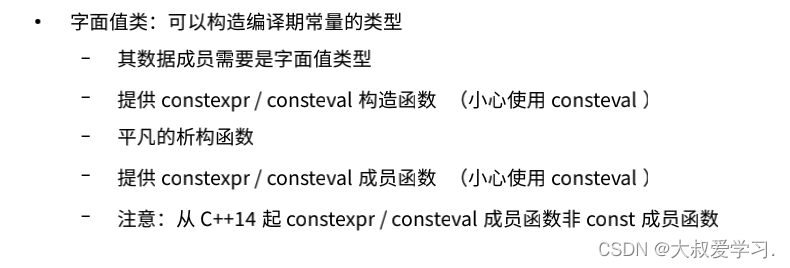
可以构造编译期的抽象数据类型。
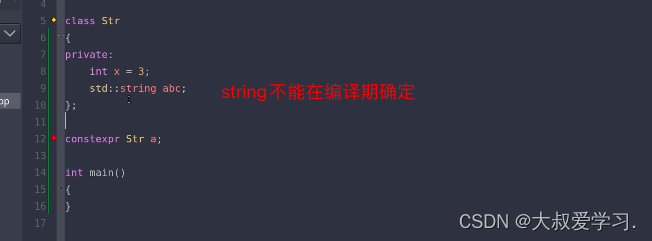
#include <iostream>
#include <string>
#include <vector>
using namespace std;
class Str
{
public:
constexpr Str(int val)
: x(val)
{
}
private:
int x;
};
// constexpr int a = 3; // 编译期的常量
// int b = 5; // 运行期变量
int main()
{
constexpr Str a(100);
}
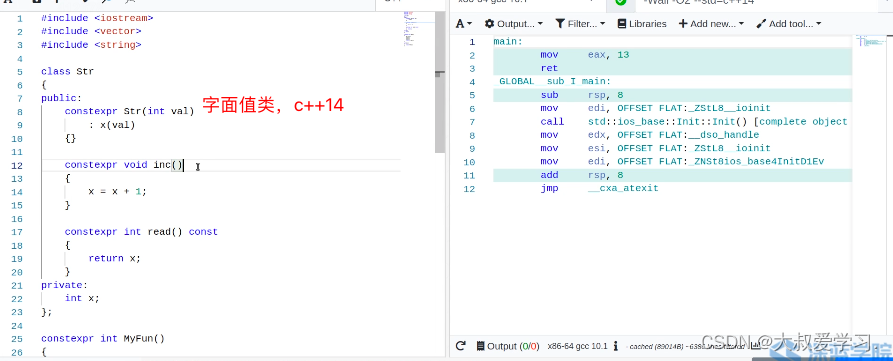
字面值类是比较特殊的数据结构,可以在编译期使用。但是使用的范围比较窄。
成员指针
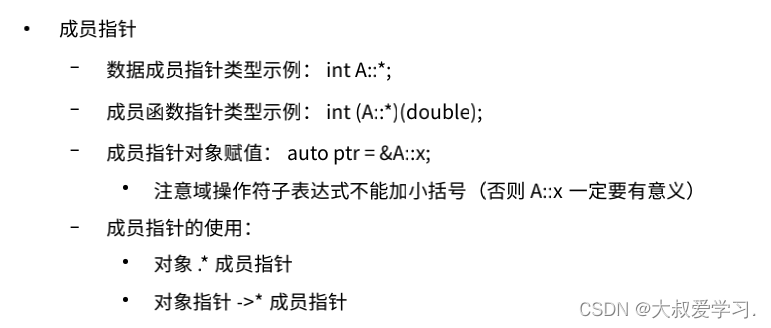
#include <iostream>
#include <string>
#include <vector>
using namespace std;
class Str
{
public:
int x;
};
int main()
{
// 声明成员指针的前提是必须有这个类,可以是定义或者声明
int Str::*ptr; //函数成员的指针,指向Str域内的int成员
void (Str::* ptr_fun) (); // 函数成员指针,指向Str域内的void 0参数的函数
int Str::* ptr1 = &Str::x; // 成员指针的赋值
}
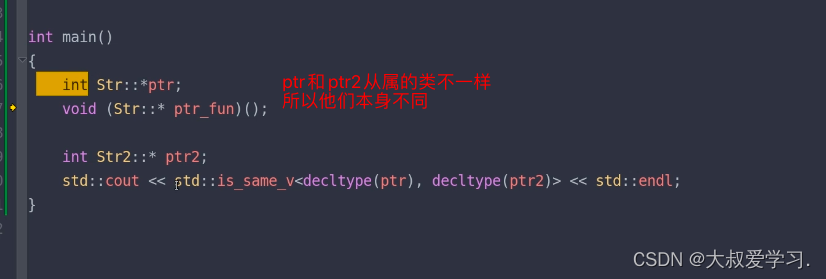
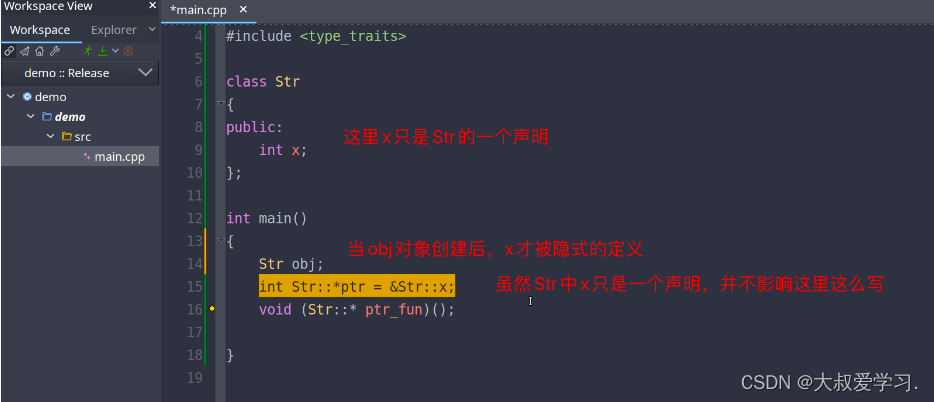
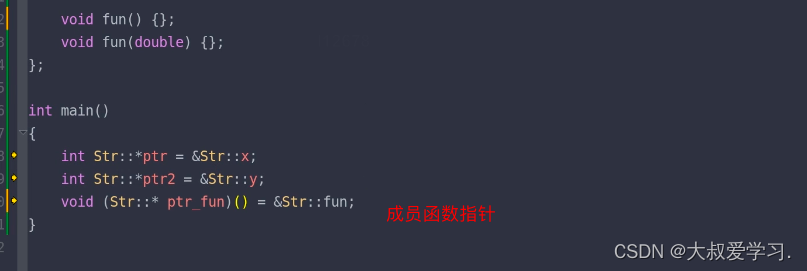

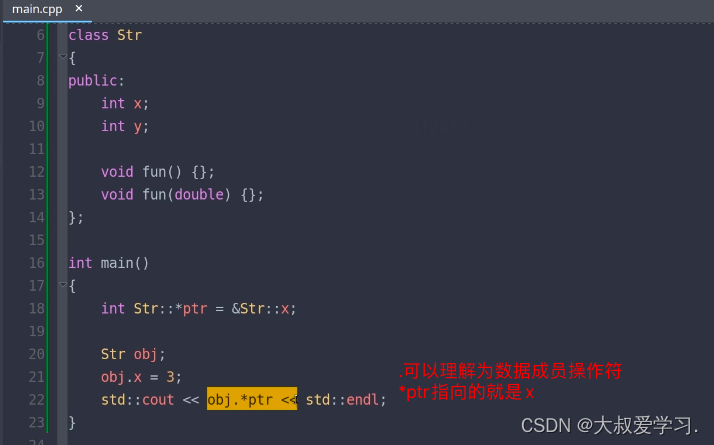


bind交互
